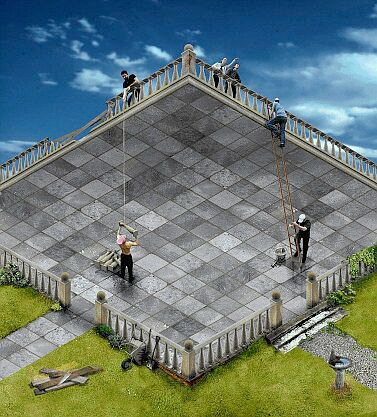Researchers define play as activity that has no purpose and that we are motivated to do for the sake of doing it. When we are involved in true play, we lose our sense of self awareness and our sense of time.
All animals play and biologists now believe that it has a critical survival role, not only during development, but throughout the life span. It was originally thought that animals play when young in order to practise skills
necessary for survival as adults. The rough-house play of pups was thought to train for hunting and fighting later in life. Many more important functions are now recognized.
Zoo-keepers can predict whether a chimp born in captivity will thrive as an adult. The single best predictor is whether or not it plays when young. Play is engaging and this engagement is critical. Whether playing with objects or engaged in social play, it appears that play is critical for brain development. In the 1960’s researchers discovered that animals raised in an enriched environment had more synaptic connections and
an increase in grey matter (bigger, richer brains) than animals raised under normal conditions.
PLAY – A GAME OR A STATE OF MIND?
When we use the word play, we think of games – often sports. In Canada, hockey, football, baseball, basketball dominate the news. Children are enrolled in numerous sports. Is this really play? It depends. If pursued for the pure enjoyment, it qualifies. If it is pursued for a purpose (impress peers, parents, make the competitive team, etc.) it changes. The outcome becomes more important than the activity and it will no longer be play. Work is not the opposite of play. Incorporating playfulness in the workplace increases motivation, creativity, problem solving, productivity and reduces burn-out. A playful attitude at work can be make work extremely engaging. Activate curiosity and add a few creative things to your activity list each day to bring a new inspiration to your work.
GETTING THE MOST FROM OUR RESEARCH ANALYSIS
Research has identified the important connection between play, health, happiness, emotional well being, creativity and productivity.
Educational systems developed ‘enrichment’ programs in schools, providing students with the opportunity for a more advanced curriculum (more work). What was missed, however was the fact the enrichment that led to brain changes was actually – play, not work! If the animals weren’t playing, there was no enrichment. Engagement in play encourages curiosity, trial and error learning, tolerating small failures, creativity, problem solving, learning social interactive skills like co-operation, dealing with competitors and reading as well as sending subtle social signals. It is now apparent that these skills are not just developed in the young and
can be forgotten about, but need to be practised and developed throughout the lifespan and especially for humans. The ability to play seems to a critical component of our life to maintain these skills.
Dr. Stuart Brown has identified a common theme among lives of serial killers – restricted opportunity for play during childhood. Today companies are incorporating play into the workplace in order to increase creativity, problem solving and productivity. The long lifespan of the residents of Okinawa has been linked in part to the elderly playing with children. Play is critical for health throughout the lifespan.
Play is purposeless, fun, and extremely healthy. Play is not defined by the nature of the activity, but our attitude to the activity we are engaged in.
SMARTER THERAPY: Tips to become more playful
- Make time for play. Lose yourself in purposeless, enjoyable activities often.
- Avoid the urge to keep score. Monitoring how well we do in purposeless activities (common) gives it a purpose, creates stress & it no longer qualifies as play.
- Resist self-consciousness. Lose your self awareness and disregard what others think when at play.
A Publication of the Centre for Cognitive Therapy. Written by Dr. Arthur Blouin.











